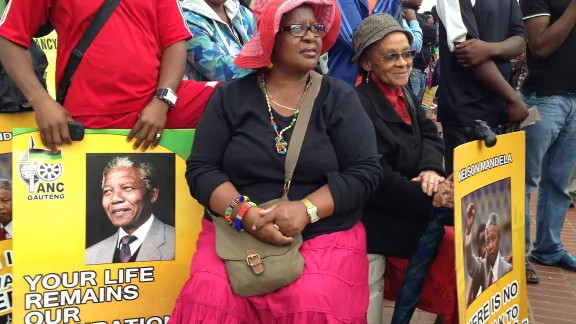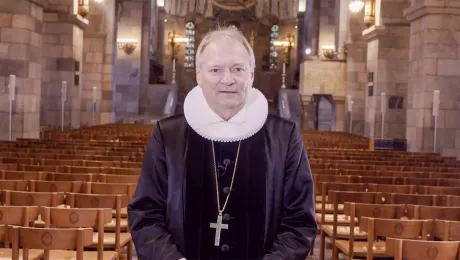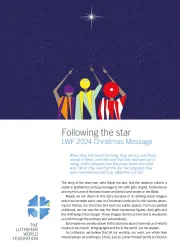
Commemoration in Soweto, South Africa. Photo: LWF/I. Benesch
LWF’s Accompaniment in a Journey towards Justice, Peace and Reconciliation
(LWI) - The Lutheran World Federation (LWF) paid tribute to the former South African President and anti-apartheid icon Nelson Mandela as a leader who “stood for principle, fought for justice, and made for peace,” in order to end racial discrimination in South Africa.
Mandela, a symbol of the liberation struggle in Southern Africa, died on 5 December aged 95. He was buried on 15 December at his ancestral home in Qunu, Eastern Cape Province.
The LWF accompanied churches’ struggle to end the apartheid system from the very beginnings of Mandela’s imprisonment until his release. From 1963 until 1990, statements from LWF Assemblies, held normally every seven years, urged all LWF member churches to be actively engaged in opposing the apartheid system and all forms of racial discrimination in Southern Africa.
The Sixth Assembly in 1977 took the unprecedented decision to adopt a status confessionis declaring that the apartheid system must be rejected on the basis of faith and in order to manifest the unity of the church. The LWF governing body affirmed that “all Christians irrespective of race, through the sacrament of baptism are members of the one church,” and that the apartheid system in many ways hindered “the exercise of Christian fellowship.”
In the following years, tension between the Assembly call and the reality within Southern Africa was discussed. At its Seventh Assembly in Budapest in 1984 the LWF Assembly suspended two of its member churches in South Africa “intending that such action serve as a help for those churches to come to clear witness against the policy of apartheid,”
As the global advocacy against apartheid intensified, the LWF increased its engagement through other platforms such as study committees, consultations involving churches in the Southern African region, visits from the LWF and actions of the LWF Executive Committee and Council. The LWF Eighth Assembly in 1990 welcomed the release of Mandela from prison, and called for continued efforts to dismantle the structures and practices of the apartheid system. In June the same year, the LWF Council voted to lift the suspension of the two churches and to maintain pastoral support to member churches in Southern Africa.
Freedom and Hope
Amidst ongoing negotiations for reconciliation in the country, then LWF General Secretary Rev. Gunnar Stålsett wrote directly to President Frederik W. de Klerk and Mandela in 1993, encouraging them to “show statesmanship and Christian responsibility by finding a creative and responsible formula to include all concerned for the sake of a peaceful South Africa, for which all of us hope and pray sincerely.”
The joint award of the 1993 Nobel Peace Prize to de Klerk and Mandela was followed by the first ever multi-racial elections in South Africa in 1994, with Mandela becoming the country’s first black president.
“The victory against apartheid is one of the greatest prophetic signs in this century. The Lutheran churches around the world join all our sisters and brothers in South Africa in celebrating the new day of democracy,” Stålsett wrote in his congratulatory letter to President Nelson Mandela, and pledged the LWF’s prayerful support to the newly elected leader of South Africa.
In his response to the LWF, Mandela thanked Stålsett along with many world leaders for his participation at his inauguration as President, describing the presence as “a clear sign of the acceptance of the new democratic South Africa on the world stage.”
The Long Walk to Freedom
During the liberation struggle, LWF’s stand against apartheid and colonial rule in Southern Africa included bursaries to young people to study in different academic fields, with many of them returning home to take up leadership positions in church, government and society.
“The LWF accompanied us—South Africa and Namibia [and other countries]—on the “long walk to freedom,” recalls retired Bishop Dr Zephania Kameeta, Evangelical Lutheran Church in the Republic of Namibia (ELCRN).
Today, ELCRN is among 16 autonomous and independent churches in the sub-region that coordinate their common work under the LWF-supported Lutheran Communion in Southern Africa. LUCSA was first established in 1966 as the Federation of Lutheran Churches in Southern Africa to respond to the growing need for communion within Lutheran churches that had been divided across racial lines.
LUCSA churches today remember Mandela’s extraordinary contribution to the tenets of justice, peace, and reconciliation. “His humble and self-deprecating nature became an example to the world and its leaders. After 27 years of imprisonment Mandela emerged not a bitter or vengeful person but as a person committed to unifying all South Africans under one banner of peace. Christ’s message of forgiveness and reconciliation echoed the path upon which Mandela forged this new, free and democratic nation,” LUCSA stated.
“As South Africa mourns the loss of their nation’s father may we all remember the lessons he taught the world, lessons that embodied the pinnacle of the human spirit and permeated our human fabric to its core,” said LUCSA.
Bishop emeritus Kameeta, a member of the LWF Council, expressed his respect and admiration for Mandela in a poem that he first wrote at the Book of Condolences at the South African Embassy in Windhoek:
“You rose on wings like eagles,
you ran and did not get weary,
you walked and did not grow weak.
You proclaimed with your words and deeds
the Good news of liberation, justice, peace
and reconciliation, until the Holy One who
gave you to us, called you back home.
Rest in peace Comrade Mandela, in God's
loving, consoling, forgiving mighty Hand. (See Isaiah 40: 29 - 31)”
In June 2013, the three Lutheran churches in Namibia invited the LWF to hold its Twelfth Assembly in 2017, the year also marking the 500th anniversary of the Reformation.


